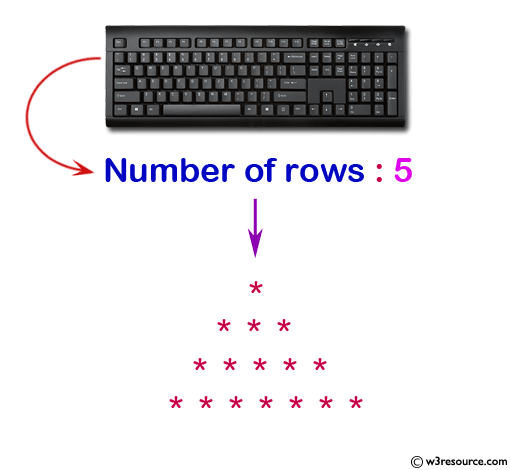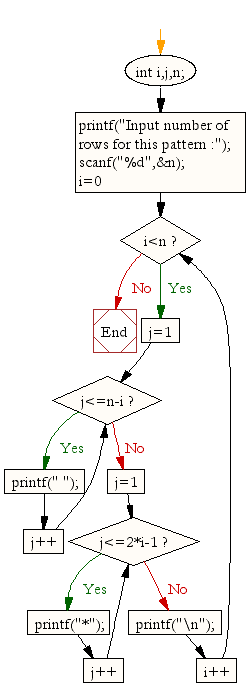C Exercises: Display the pattern like a pyramid containing odd number of asterisks
C For Loop: Exercise-20 with Solution
Write a program in C to display the pattern like a pyramid using asterisk and each row contain an odd number of asterisks.
The pattern is as below:
* *** *****
Pictorial Presentation:

Sample Solution:
C Code:
#include <stdio.h>
void main()
{
int i,j,n;
printf("Input number of rows for this pattern :");
scanf("%d",&n);
for(i=0;i<n;i++)
{
for(j=1;j<=n-i;j++)
printf(" ");
for(j=1;j<=2*i-1;j++)
printf("*");
printf("\n");
}
}
Sample Output:
Input number of rows for this pattern :5
*
***
*****
*******
Flowchart :

C Programming Code Editor:
Improve this sample solution and post your code through Disqus.
Previous: Write a program in C to display the n terms of harmonic series and their sum.
Next: Write a program in C to display the sum of the series [ 9 + 99 + 999 + 9999 ...].
What is the difficulty level of this exercise?
Test your Programming skills with w3resource's quiz.
C Programming: Tips of the Day
Static variable inside of a function in C
The scope of variable is where the variable name can be seen. Here, x is visible only inside function foo().
The lifetime of a variable is the period over which it exists. If x were defined without the keyword static, the lifetime would be from the entry into foo() to the return from foo(); so it would be re-initialized to 5 on every call.
The keyword static acts to extend the lifetime of a variable to the lifetime of the programme; e.g. initialization occurs once and once only and then the variable retains its value - whatever it has come to be - over all future calls to foo().
Ref : https://bit.ly/3fOq7XP
- New Content published on w3resource:
- HTML-CSS Practical: Exercises, Practice, Solution
- Java Regular Expression: Exercises, Practice, Solution
- Scala Programming Exercises, Practice, Solution
- Python Itertools exercises
- Python Numpy exercises
- Python GeoPy Package exercises
- Python Pandas exercises
- Python nltk exercises
- Python BeautifulSoup exercises
- Form Template
- Composer - PHP Package Manager
- PHPUnit - PHP Testing
- Laravel - PHP Framework
- Angular - JavaScript Framework
- Vue - JavaScript Framework
- Jest - JavaScript Testing Framework
